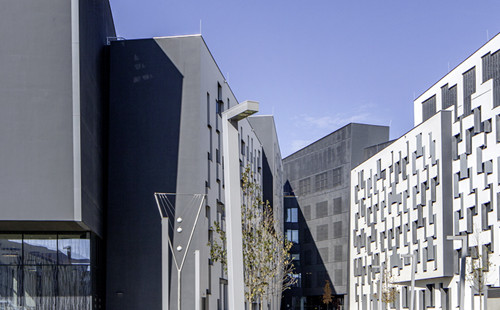WU-Lecture in Economics
Beyond WU-Lecture in Economics the Department of Economics organizes as part of the series of WU matters. WU talks lectures with international and local speakers on interesting economic topics.
WU Lecture in Economics 2024
Univ.Prof. Gabriel Felbermayr - WU matters. WU talks. Free trade is out of steam

© WU TV
How the new world (dis)order threatens our prosperit
WU Lecture in Economics 2024 - Univ.Prof. Gabriel Felbermayr - 2024, Dec 18
This Event is organized by the Department of Economics

Der Freihandel hat fertig | WU…
Upon activation, some data may be transmitted to third parties (YouTube). For further information, please see our Data Protection Statement.
WU Lecture in Economics 2023
Univ.Prof. Matthias Doepke - WU matters. WU talks. Love, Money and Parenting

© WU TV
About the economy of the different parenting styles.
WU Lecture in Economics 2023 - Univ.Prof. Matthias Doepke, - 2023, Dec 20
This Event is organized by the Department of Economics
Helicopter parents in the USA, authoritarian parents in China and anti authoritarian education in Sweden – are the different parenting styles simply an expression of national cultural norms and traditions? Or rather are they economics incentives and constraints, paired with economically framework conditions, that form the parenting practices in different countries and that shape our imagination what is good parenthood? Will the growing inequality lead to “Parenting Gap” between wealthier and poorer families?
In this lecture Matthias Doepke presents a new approach to declare educations and parenthood from an economic perspective.
Lecture:
Univ.Prof. Matthias Doepke, PhD, LSE - London School of Economics and Political Science
Moderated by:
Gerlinde Fellner-Röhling, Associate Professor of Economics, WU Vienna University of Economics and Business and Department Chair Deputy of the Department of Economics
This event will be held with a physical presence, there will be no livestream
Further information and sign-up page
Watch the full wu lecture in economics here:

Love, Money & Parenting | WU…
Upon activation, some data may be transmitted to third parties (YouTube). For further information, please see our Data Protection Statement.
here are a few pictures from the event:
WU Lecture in Economics 2022
Francesco Zanetti - WU matters. WU talks. Macroeconomic Policy in Times of War

© WU TV
Can economic modeling save the economy?
WU Lecture in Economics 2022 - Francesco Zanetti - 2022, Dec 14
This Event is organized by the Department of Economics
The Ukraine war has led to global uncertainty, increased inflation, and reduced economic growth in Europe. How should macroeconomic policy react to such global shocks in the context of growing uncertainty?
What can we learn from macroeconomic models and empirical research? Can standard models deal with the situation and provide good policy advice? With academics and policymakers, we’ll be discussing how economics can help governments deal with macroeconomic shocks in times of high uncertainty.
Lecture:
Francesco Zanetti, Associate Professor in Economics, University of Oxford and David Richards Fellow of Wadham College
Moderated by:
Katrin Rabitsch, Associate Professor of Economics, WU Vienna University of Economics and Business
Further information and sign-up page
Watch the full wu lecture in economics here:

wu matters Macroeconomic Policy…
Upon activation, some data may be transmitted to third parties (YouTube). For further information, please see our Data Protection Statement.
here are a few pictures from the event:
WU Lecture in Economics 2021
Gabriel Felbermayr - WU matters. WU talks. Geoökonomik und Nullsummenlogik

© WIFO - Alexander Müller
WU Lecture in Economics 2021 - Gabriel Felbermayr - 2021, Dec 15
So unterschiedlich wie die Länder selbst sind ihre politischen und ökonomischen Systeme. Auch lange nach Ende des kalten Krieges sind ihre Ziele und Instrumente noch immer enorm heterogen. Zudem erschwert die Nullsummenlogik, Lösungen für globale Herausforderungen wie den Klimawandel zu finden. Wir gehen der Frage nach, was diese geostrategischen Rivalitäten für die internationale Handelspolitik bedeuten. Welche Konsequenzen ergeben sich daraus für die WHO und die EU? Und welche Strategien gibt es, um unseren Wohlstand zu schützen?
Vortrag: Gabriel Felbermayr, Universitätsprofessor für Wirtschaftspolitik, WU; Direktor, Österreichisches Institut für Wirtschaftsforschung (WIFO)
Podium und Moderation:
Ingrid Kubin, Universitätsprofessorin für Internationale Wirtschaft, WU; Vizepräsidentin des Vorstands, Österreichisches Institut für Wirtschaftsforschung (WIFO)
Harald Oberhofer, Universitätsprofessor für Empirische Wirtschaftsforschung, WU; Senior Economist, Österreichisches Institut für Wirtschaftsforschung (WIFO)
Watch the full wu lecture in economics here:

wu matters 2021 12 15…
Upon activation, some data may be transmitted to third parties (Vimeo). For further information, please see our Data Protection Statement.
here are a few pictures from the event:
Department of Economics
























